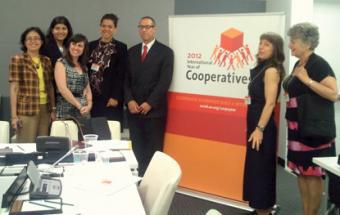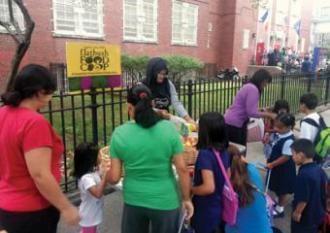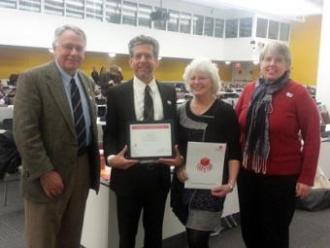NYC: Acting Locally to Build a Global Cooperative Economy



Imagine what it would like to be part of a far-reaching movement imbued with values of economic democracy that circumnavigates the globe. Imagine that more than 1 billion people in every country on the planet are served by these democratic entities, and that the 300 largest of these could generate a staggering $1.6 trillion in economic commerce. Take that vision a little further and conjure a world where 50 percent of agricultural output is distributed and marketed through cooperatives. Now recognize that all this is the current reality of the global cooperative economy!
This was some of the take-away messaging that was presented at a panel discussion we attended at the United Nations (UN), titled “Sustainable Development Goes Local: How NYC Cooperatives Are Advancing the UN Millennium Development Goals“ on July 12, 2012—commemorating the UN International Year of Cooperatives at the UN itself. These Millennium Development Goals embrace the UN’s commitment to further enhance education about the cooperative business model, support national policies that bolster the co-operative economy, and promote accelerated development of cooperatives as a bastion of socioeconomic value. Together, they reflect the key objectives of the UN International Year of Cooperatives.
The panel discussion commenced with a welcoming taped message from UN Secretary General Ban Ki-moon who championed cooperatives as entities that “support food security, are better tuned for local needs, and promote global solidarity for a better world.“ In another prerecorded video, Dame Pauline Green, president of the International Cooperative Alliance, praised “the billion of cooperators worldwide building cohesion and prosperity locally“ while impacting the global economy.
The meeting was deftly chaired by Felice Llamas, an officer in the focal point on cooperatives, Division for Social Policy and Development of the UN’s Department of Economic and Social Affairs. The presenting panelists included Manisha Shah, deputy general counsel of UNFCU (UN Federal Credit Union); three representatives from the cooperative housing sector, including Marina Metalios, project manager, and Anya Irons, general counsel, both with the Urban Homesteading Assistance Board (UHAB); Mary Ann Rothman, executive director of the Council of New York Cooperatives and Condominiums (CNYC, Inc.); Vanessa Bransburg, LMSW cooperative coordinator at the Center for Family Life of Sunset Park, Brooklyn, N.Y.; and Leslie Dreifus, board president at the Flatbush Food Co-op in Brooklyn.
An engaged audience of attendees, many of whom worked at the UN, was treated to an inspiring introduction to the empowering role played by these cooperatives in their various sectors. Manisha Shah (UNFCU) enlightened us to the challenges of operating a credit union with assets exceeding $3.5 billion, providing financial services to over 94,000 members in more than 200 countries. For more than 60 years, UNFCU has “served the people who serve the world,“ as well as engaging in philanthropic efforts to promote such socially responsible programs as providing financial planning to small credit unions and non-governmental organizations worldwide, and supporting environmental sustainability and numerous projects addressing health, youth, and women’s issues. It’s certainly noteworthy and reassuring to know that as values-based and member-led organizations, cooperative banks and credit unions have weathered the shock of the upheaval in the world economy.
Next, Leslie Dreifus gave a brief history of the Flatbush Food Co-op, documenting our growth from an 11-member buying club started in a founding member’s basement in 1976 to a thriving 5,000+ member-owned cooperative enterprise occupying a 6,000-square-foot store that generates over $11 million in annual sales. This sustained growth has vaulted us to a position of being the largest business in our seven-block commercial strip, providing fair-wage jobs to 62 residents of the community.
Dreifus further offered that Flatbush Food Co-op has served as a vital and stabilizing anchor in the revitalization of our local community by attracting new families, restaurants, and other businesses, all without supplanting the community’s remarkable ethnic and religious diversity. As photos of our store and community were projected, he touted how U.S. food co-ops were at the forefront of supporting the growth in the availability of locally grown, organic, and fair trade products, and added that co-ops played a pioneering role in bringing these products to our local Brooklyn neighborhoods. He ended his presentation by noting that our Ends policies spur us to engage with the greater cooperative world, providing resources to educate both our members and community on nutrition, health, and “green“ initiatives, as well as providing critical support to locally based programs and organizations working in areas concerned with the area of sustainability and community empowerment.
The next presenter, Vanessa Bransburg, gave a stirring overview of the Workers Cooperative Project, a program run by the Center for Family Life, which provides neighborhood-based services to a largely immigrant community in Sunset Park, Brooklyn. She focused on the development of a model project, a women-owned and -managed workers’ cooperative engaged in cleaning services, called Si Se Puede (We Can Do It). Since 2006, the initiative has grown from a starting base of 15 members earning about $8/hour on average to a recent total of 27 cooperators serving 1,000 clients and earning a livable wage; the average is nearly $20/hour. This successful model has spawned the growth of two additional cooperative businesses, Beyond Care and Golden Steps, which provide home-based childcare and eldercare. Key aspects to cultivating these models for the empowerment of immigrant communities were the emphasis on group-centered planning and process in their development, and an understanding that meaningful job creation needed to be centered on skills the participants already had.
The largest share of cooperative business clout in NYC resides in the housing sector. As MaryAnn Rothman of CNYC Inc. noted, half of all cooperatives nationwide are in NYC. Beginning in 1918, when a group of Finnish artisans started the first housing cooperative organized under the Rochdale principles of cooperation, housing cooperatives have grown to provide a robust share of NYC’s housing market, particularly in the creation of low-to-middle-income, limited-equity, government- and union-sponsored units. Marina Metalios of UHAB described a “sweat equity“ tenant-centered model that has helped create affordable tenant-controlled housing cooperatives from decaying slumlord-owned or abandoned rental buildings. Anya Irons of UHAB added that the successes of these community empowerment models rested on tenant-organizing support, shareholder training, and legal and other development services. This exemplary achievement in the NYC housing market has created the largest community of shared-equity housing co-ops in the country.
Taken together, these presentations offered a powerful vision of the vital role that the cooperative economy plays in building and promoting sustainable business practices, built on a foundation of participatory democratic ownership. Who would have known that the cooperatives employ more than 100 million people worldwide, 20 percent more than the aggregate of all multinational businesses, without the UN’s key role in raising awareness of the contributions of the cooperative model? At the local level, we need to strive to promote and grow our people-centered, not shareholder-profit-driven, model of social and economic development. We owe it to the world!







